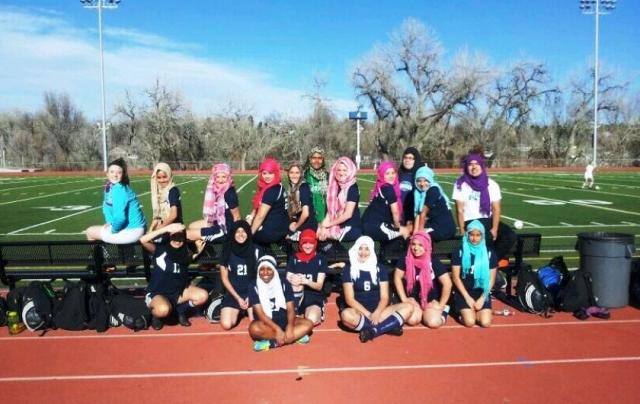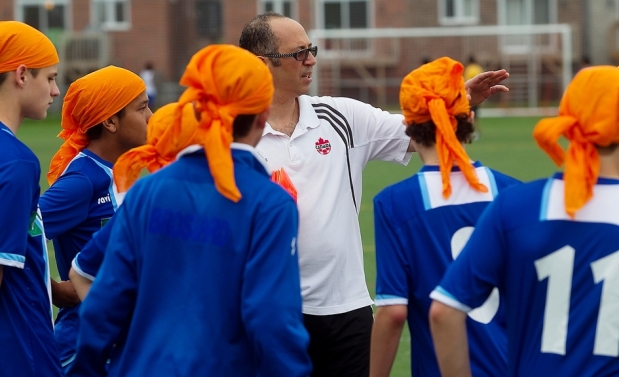When the Overland High School Trailblazers opened their varsity soccer season against the Fairview High School Knights on March 12, the girls were short one player. The referees sidelined Trailblazer Samah Aidah as a result of a pre-game ruling that her hijab, a headscarf worn by Muslim women as a sign of modesty and devotion, created an alleged "danger." 
Teens usually join sports teams to play, and not to vindicate civil rights, but Samah's coaches and teammates resolved to stand with her. Most of the Trailblazers were not Muslims, but in the next game two days later, each and every one wore a hijab.
Trailblazer Divine Davis tweeted that, "I think it's okay for girls to play sports in their hijabs and they should not be questioned or restricted from playing. No matter what sports."
Davis and her teammates got plenty of support. When she tweeted a photo of the entire team donned in hijabs at the second game, the photo was re-tweeted around the world more than 40,000 times.
Overland lost the second game, but they won the greater point. Referees permitted them to play wearing hijabs, and the controversy taught lessons about tolerance and mutual respect, with the teens themselves as the teachers.
"A Bigoted Stance"
I do not know the motivation of the referees who refused to permit Samah Aidah to play in Overland's season opener. I am suspicious, however, given that the Federation Internationale de Football Association (FIFA), soccer's world governing body, had recently cleared female players to wear hijabs at all levels of play.
It also seems an uncomfortable coincidence that, in matters of conscience or equality, youth leaguers banished by referees and other adults tend to be religious, ethnic or racial minorities who are perceived as "different" or otherwise arouse measurable disfavor.
Case in point: my Heroes blog last July was about the FC Brossard U14 AA boys soccer team in suburban Montreal who protested the decision of the Quebec Soccer Federation (FSQ) to arbitrarily bench between 100 and 200 Sikh boys whose religious beliefs prevented them from removing their head turbans during youth soccer games. When the FSQ announced the ban on turbans, its director general  bluntly told Sikh parents that they and their sons "ha[d] no choice" but to decide between faith and soccer. Some of the banished boys were as young as six.
bluntly told Sikh parents that they and their sons "ha[d] no choice" but to decide between faith and soccer. Some of the banished boys were as young as six.
The FSQ defended its ban as a safety measure, but the director general admitted that no medical evidence demonstrated any danger, and that no youth soccer injury had ever been attributed to turbans. Not only that, but Sikh youth soccer players were already permitted to wear turbans throughout the rest of Canada, and FIFA affirmed that Sikh turbans were no cause for excluding players at any level of the game. Some observers suspected that the FSQ's defiance stemmed from animosity that some leaders of Quebec's French-speaking majority held toward the visible, successful Sikh minority who look different than most of their neighbors.
Like the Overland girls soccer team last month, the Brossard U14 AA boys soccer team sent a powerful message. None of the Brossard players was Sikh, but they went to the local Sikh temple to borrow twenty scarves that they all wore as turbans in the next game. Publicity about the Brossard teens' gesture energized national and worldwide condemnation of Quebec's turban ban, which the Toronto Star denounced as "a bigoted stance that has no medical, statistical or legal backing of any kind." When the beleaguered FSQ rescinded the ban within a few days, the Brossard U14s' defiance prevailed.
Targeting vulnerable minorities
Muslims and Sikhs are not the only vulnerable minorities sometimes targeted by officials who threaten to exclude youngsters who play clean, follow the rules of the game, and seek the rewards and challenges of sports. Early last December, two referees in Cooper City, Florida ejected a youth soccer coach from a game for instructing some of his 14-18-year-olds in Spanish. The coach had refused to heed the refs' instructions to speak only English. The ejected coach later said that various referees had also tried to discourage players from speaking Spanish to one another during games.
The Cooper City story recalls a similar incident that took place in 2005 during a Little League state tournament game in Lakeville, Massachusetts. In the third inning of the semifinals, an assistant coach instructed his 14-year-old pitcher in Spanish to try to pick off a runner at second base. The press reported that the pitcher and catcher did not speak English fluently.
The Lakeville umpire stopped the game, instructed the assistant coach to speak only English, and threatened to eject any player or coach heard speaking Spanish to one another. The team's manager called the umpire's instruction "sickening," but he continued the game when the tournament director on the scene backed the umpire.
In both Cooper City and Lakeville, embarrassed officials disavowed any English-only rule within a few days. Little League International, which publishes its rule book in both English and Spanish, instructed state officials to remove the Lakeville umpire from further games in the state tournament.
Celebrating diversity
When disturbing incidents such as these happen in soccer, baseball or other games, they remind us that sports provides unique opportunities for youngsters of various backgrounds to participate in mainstream national culture. Because sports is rightfully called "a microcosm of American society" and "one of the most powerful social forces in our country," youth sports should look like America. The impulse to include, rather than exclude, children marks youth sports at its finest in the United States, whose national educational policy vows to "leave no child behind."
Attempts to force children to disavow their religious beliefs, or to speak a language they have not yet mastered, serve no worthwhile purpose because arbitrarily excluding children from wholesome childhood activities serves no worthwhile purpose. When youngsters from diverse cultures play clean, follow the rules, and contribute to the team, sports programs serve the community best when they encourage spirited competition in an atmosphere marked by tolerance and respect for individual differences.
Name of the game: equality
"You all might have been players," someone tweeted the Overland Trailblazers' Divine Davis, "but you just became a team." "[F]ortunately," said another tweet, "the girls of Overland High School soccer were there to teach . . . a lesson about equality."



















